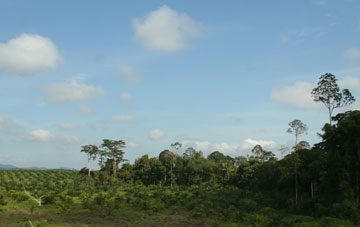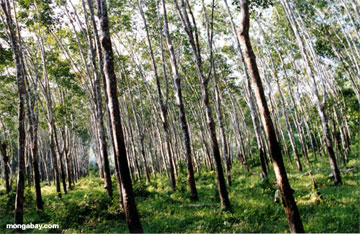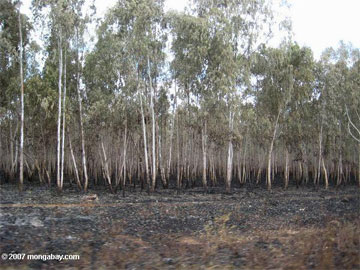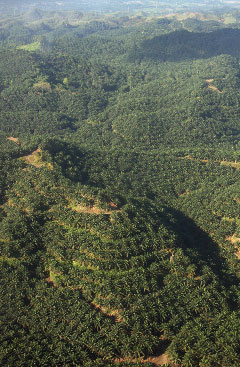Monoculture tree plantations are “green deserts” not forests, say activists
Jeremy Hance, mongabay.com
September 19, 2008
A number of environmental and social organizations have declared September 21st: International Day against Monoculture Tree Plantations to highlight the social upheaval and environmental degradation — including impacts on global biodiversity and climate change — wrought by industrial plantations.
"Tree plantations are not forests. A plantation is a highly uniform agricultural system that replaces natural ecosystems and their rich biodiversity,” Sandy Gauntlett of the Pacific Indigenous Peoples Environment Coalition said. “The trees planted are geared to the production of a single raw material, whether it is timber, pulp, rubber, palm oil or others.”
The products grown on industrial tree plantations depend on the region. In Southeast Asia and the Pacific, palm oil has resulted in large-scale conversion of tropical forests, especially in Malaysia, Indonesia, and Papua New Guinea. In Africa, plantations produce rubber, wood pulp, and cacao, in addition to palm oil. Nigeria, Cameroon, Liberia, Swaziland, and South Africa are particularly affected by monoculture tree plantations. Pine and eucalyptus are grown in Brazil, Argentina, Chile, Ecuador, and Uruguay. Palm oil for biofuels is also grown in Colombia and Venezuela. Malaysia has recently stated that it intends to expand palm oil into the Amazon.
|
Rubber plantation in Thailand |
Simone Lovera of the Global Forest Coalition says that “plantations form part of an industrial model for the production of abundant and cheap raw material that serves as an input for the economic growth of the industrialized countries. What the producer countries get are environmental degradation and rising poverty, which are the ‘externalized costs’ of this cheap raw material.” Since 1980 tropical forest plantations have expanded by almost fivefold.
For these reasons, environmental organizations, indigenous peoples’ groups, and social movements will spend Sunday, September 21st participating in demonstrations, marches, and mailing letters of concern.
Climate Change and Biodiversity
Recent studies have shown that monoculture tree plantations have a twofold impact globally: loss of biodiversity and net emitters of carbon.
The forestry industry has argued for year that tree plantations should receive carbon credits for being carbon sinks, however recent research reveals the opposite. Last week a report published in Nature showed old-growth forests store carbon for centuries, whereas plantations and young forests are actually net emitters of carbon due to the disturbance of the soil and the degradation of the previous ecosystem. The study, which analyzed 519 forest plots worldwide, found that boreal and temperate zone forests in the Northern Hemisphere sequester 0.8 to 1.8 billion tons of carbon annually.
|
Eucalyptus plantation in Kenya |
Several studies have demonstrated that when an ecosystem is destroyed for a monoculture plantation, biodiversity suffers. A study of frogs and lizards in the Amazon showed that primary forest contained far more species, whereas industrial plantations only allowed the survival of a few habitat-generalists. Another study in the Amazon showed an overall loss of 25 percent of species from primary forest to plantations. Bird, amphibian, and lizard biodiversity fell by 40 to 60 percent. In addition, the study’s authors say they believe their results “underestimated” overall loss, since the plantations they studied were adjacent to primary forest.
A review released this week may confirm that: according to researchers, primary forest converted to oil palm plantations caused an 83 percent loss in biodiversity. Currently 11 million hectares have been converted into palm oil, endangering innumerable species in Southeast Asia and the Pacific. In Malaysia alone palm oil plantations cover 4.4 million hectares: 13 percent of Malaysia’s total land area.
Societal Impacts
In a joint press release, World Rainforest Movement, Friend of Earth International, and Global Forest Coalition list a number of local environmental and social problems created by monoculture tree plantations: “the depletion of water sources due to changes in the hydrological cycle; deterioration of rivers and streams; air and water pollution due to the use of pesticides and other agrochemicals; the displacement of entire communities when their land is occupied by plantations; violations of human, labor and environmental rights; differentiated impacts on women; the deterioration of cultural diversity; [and] widespread violence.”
|
Eucalyptus plantation in Kenya |
Many of the affected communities lived traditional and sustainable lifestyles for centuries before industrial plantations upset their way of life. All of them depended on the land for their livelihood. Isaac Rojas of Friends of the Earth International adds that “on the lands currently occupied by plantations, there used to be or could be agricultural crops that would help ensure the people’s food sovereignty, managed by peasant communities. Or these communities and indigenous peoples could use the land for sustainable activities that would improve their quality of life, such as community forest management.”
Several studies suggest that relative to small-scale agroforestry and communal forest management, industrial plantations offer fewer employment opportunities. Between mechanization, importation of labor, and the mass harvesting and processing of plantation products, the overall number of livelihoods sustained a given area are reduced by conversion to monocultures.
Labor injustice is a further concern. Just this week Indonesia’s Commission for Child Protection accused Malaysian plantation owners of child slavery. The group estimates that about 72,000 children are forced to work without legal regulations. To avoid detection by authorities, the plantations do not issue birth certificates. The result: children of plantations workers do not have the right to attend school.
International encouragement of monoculture plantations
Despite the detrimental impacts of monoculture plantations in regard to biodiversity, climate change, and local people, government policies continue to promote the establishment of industrial plantations.
 Facing increasing criticism from environmental groups over deforestation and pollution from plantations, the palm oil industry has launched a two-pronged response: cleaning up operations by establishing criteria for sustainable production (the Roundtable on Sustainable Palm Oil – RSPO) and global PR campaign to promote the virtues of palm oil while simultaneously attacking critics via editorials, blogs and web sites. The marketing effort has included misleading claims on the carbon balance and biodiversity value of plantations. |
“International institutions like the FAO and the World Bank, as well as government agencies in countries like New Zealand, incorrectly define plantations as forests, despite abundant documentation which proves that the only thing they have in common is the presence of trees,” Gauntlett said. “By calling them forests, these institutions and governments help to impose and perpetuate an unsustainable monoculture plantation production model.”
The European Parliament currently promotes the second-generation of biofuels produced from wood and forestry firms in the U.S. are pushing the government to do the same. Activists say that an increase in demand for particular woods would lead to rapid growth in monoculture tree plantations worldwide. International policy measures to counter greenhouse gas emissions may also soon contribute to the expansion of plantations. Some nations hope to create a fund under the Framework Convention on Climate Change to finance large-scale tree plantations. Subsidies would be given to tree plantation implementation based on the belief that such plantations mitigate climate change when in fact, plantations established in place of natural forests are a source, not a sink, of carbon.
Through its efforts on September 21st, the coalition of environmental groups hopes to highlight these grievances in order to change the public’s view of tree plantations.
“All ‘international days’ refer to problems of global importance that need the world’s attention. The expansion of large-scale tree monoculture plantations is one of these problems. That is why this 21 September will give greater visibility to the great many struggles being waged around the world and demonstrate the negative impacts of this model,” said Ricardo Carrere of the World Rainforest Movement (WRM). “21 September is also the [U.N.’s] International Day of Peace and this is what the people waging this struggle are fighting for: Peace, so that the communities affected can recover their way of life in harmony with Nature and with other people.”










